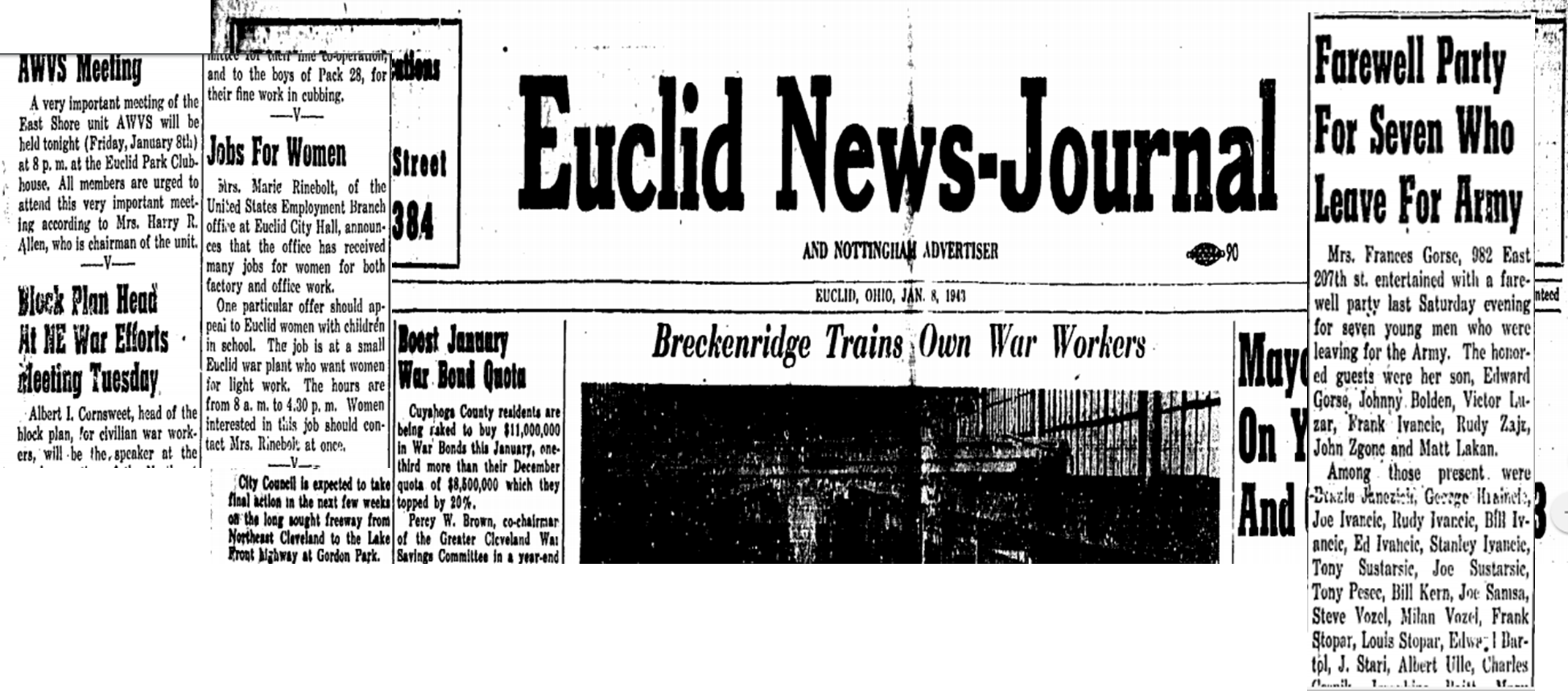by Lisa Cooke | Jul 17, 2015 | 01 What's New, British, Digital Archives, Findmypast, images, Newspaper

Every Friday, we blog about new genealogy records online. Do any collections below relate to your family history? Please share with genealogy buddies or societies that might be interested! This week: Midwestern U.S. newspapers (Cleveland, OH and Chicago, IL) and records of Pennsylvania coal and canal workers’ and English and Welsh criminals.
CLEVELAND JEWISH NEWS. Technically this isn’t new content, but access to the Cleveland Jewish News is newly free, so it’s new to most of us! You do need to provide your name and email address for free access to 125 years of Cleveland Jewish newspapers. Subscribers have immediate access to all content as it is published; the public can access materials 90 days after they go online.
CHICAGO TRIBUNE ARCHIVE. For a very limited time–during beta testing of its new archive–old issues of The Chicago Tribune are free to search on its Archives website. Click here for their FAQ page or read a more detailed report on the National Genealogical Society (US) blog.
ENGLAND & WALES REGISTER OF CRIMINAL PETITIONS. Findmypast added over 77,000 records to its Registers of Criminal Petitions index to imaged registers of correspondence relating to criminal petitions. Documents usually give the outcome of any appeal and registers note the place of imprisonment.
PENNSYLVANIA COAL AND CANAL WORKERS. Ancestry just posted employee cards and applications from the Lehigh Coal and Navigation Company for first half of the twentieth century. “The cards may list name, marital status, occupation, birth date, record date, residence, spouse, nationality, number of children and their ages, citizenship, date range for jobs, who to notify in case of an accident, and pension date. Applications can contain other details, including parents’ names, schooling, employment record, birthplace, and height and weight.”
 When searching digitized newspaper sites, remember that the search technology used (optical character recognition) is much less thorough for historical newspapers than modern text, especially for capitalized words. Use creative search terms if searches on an ancestor’s name aren’t productive, like the person’s occupation or death date. Click here to learn more about using Google to search digitized newspaper pages, or read Lisa Louise Cooke’s newly-revised and updated book The Genealogist’s Google Toolbox, available now both in print and e-book format.
When searching digitized newspaper sites, remember that the search technology used (optical character recognition) is much less thorough for historical newspapers than modern text, especially for capitalized words. Use creative search terms if searches on an ancestor’s name aren’t productive, like the person’s occupation or death date. Click here to learn more about using Google to search digitized newspaper pages, or read Lisa Louise Cooke’s newly-revised and updated book The Genealogist’s Google Toolbox, available now both in print and e-book format.
by Lisa Cooke | Jan 4, 2016 | 01 What's New, Organization
A recent experience reminded me how important it is to invest time getting to know the things we work with–whether they’re genealogy databases or a new piece of technology.The ProblemThe other day I was trying to do something I thought was very simple:...
by Lisa Cooke | Jul 20, 2013 | 01 What's New, Ancestry, Military, Records & databases, Technology
Now when you discover an ancestor’s record on Fold3.com, you can save it to your online tree at Ancestry.com.
According to Fold3.com’s press release: “Whenever you see a green ‘Save to Ancestry’ button above a document or on a Fold3 memorial page, you can link that document or page directly to someone’s profile on Ancestry.”
“You’ll be asked to log into your Ancestry.com account, and then you’ll see a drop-down list of your trees. Locate the tree you wish to save the document to, begin typing the name of the person to whom the record should be attached, choose the correct name from the list that appears, and then press save.”
Watch a tutorial video to learn more and see how it’s done.
by Lisa Cooke | Jan 14, 2017 | 01 What's New, Newspaper
Newspapers can fill in the gaps to the long-lost stories of your ancestors. These tips will help you narrow your search in digitized WWII newspapers for experiences directly relating to the war and to the lives of your ancestors.

In this previous post, I provided step-by-step tips for locating WWII-era newspapers. Those tips helped you locate the actual newspapers. In this post, I’ve got 7 tips for to help you focus on narrowing down a large list of results in search of war-related family stories.
Tip 1: Try Various Name Combinations in WWII Newpapers
If you are keyword searching in digitized newspapers, remember to try different name combinations. A man may be identified by just his first initial and last name. During the 1940s, a woman might be referred to as “Mrs. Ted Johnson” instead of Barbara Johnson.
Tip 2: Search for Addresses
You might find a family identified as “the Johnson’s of 132 Cherry Lane,” so try using street addresses in your searches, remembering that “Lane” might be spelled out or abbreviated. You may also find the family listed by their town or township. An example of this might be “the Johnson’s of Brown township,” or “the Johnson’s of Conover.”
Tip 3: Expand Your Search to Events and Organizations
Use any search terms you already know about for your family in World War II: a military unit, a battle or local service organization, or a war effort project that the folks back home may have helped out with. Do family stories mention rationing, air raid drills, bomb shelters, blackout rules, or one of the women getting a job at a certain factory? All these make excellent search terms.
Tip 4: Take Time to Browse
Browsing the pages will give you a sense of how the war affected everyday life at home. You may find recipes that make the most of ration allowances and reminders about blackout rules and curfews. You may even find tips on how to conserve gasoline or how to be fashionable without silk stockings!

Almost every news item on the front page of this Jan 8, 1943 issue of the Euclid News Journal (OH) has to do with the war. It’s easy to see how the war affected everyday life of this small Ohio city on the shores of Lake Erie. Issues of this paper are searchable at the Euclid Public Library website (click image to view more issues.)
Tip 5: Be Aware of Newspaper Stoppages
If your family lived in an area that came under attack or was occupied, the local newspapers may have stopped printing. In that case, search other papers to see if they reported what was going on in your ancestor’s town.
Tip 6: Keep an Eye on the Homefront
For relatives who served in the military, watch for updates in local papers about how they were faring on the fronts during the war. Watch for casualty lists of the wounded, dead, and missing. Here’s something cool: newspapers also printed maps showing the progress of the war on the various fronts.
Tip 7: History Provides Hints
If you’re looking for reports about soldiers’ bodies returning home and funeral services, it will help to know that according to an article in The Wall Street Journal, the War Department didn’t start bringing back remains until the fall of 1947 because of the huge logistical challenges involved. Over 93,000 American soldiers who died in World War II are buried overseas in one of the American Battle Monuments Commission cemeteries.
Making the Most of Newspapers for Family History
 Find more tips like these in my book, How to Find Your Family History in Newspapers. You’ll find step-by-step instructions for my foolproof research process, along with everything you need for success: worksheets and checklists, tons of free online resources (and websites worth paying a few bucks for), a massive amount of location-specific websites (U.S. and international)–and a case study that puts it all to the test!
Find more tips like these in my book, How to Find Your Family History in Newspapers. You’ll find step-by-step instructions for my foolproof research process, along with everything you need for success: worksheets and checklists, tons of free online resources (and websites worth paying a few bucks for), a massive amount of location-specific websites (U.S. and international)–and a case study that puts it all to the test!
 When searching digitized newspaper sites, remember that the search technology used (optical character recognition) is much less thorough for historical newspapers than modern text, especially for capitalized words. Use creative search terms if searches on an ancestor’s name aren’t productive, like the person’s occupation or death date. Click here to learn more about using Google to search digitized newspaper pages, or read Lisa Louise Cooke’s newly-revised and updated book The Genealogist’s Google Toolbox, available now both in print and e-book format.
When searching digitized newspaper sites, remember that the search technology used (optical character recognition) is much less thorough for historical newspapers than modern text, especially for capitalized words. Use creative search terms if searches on an ancestor’s name aren’t productive, like the person’s occupation or death date. Click here to learn more about using Google to search digitized newspaper pages, or read Lisa Louise Cooke’s newly-revised and updated book The Genealogist’s Google Toolbox, available now both in print and e-book format.




